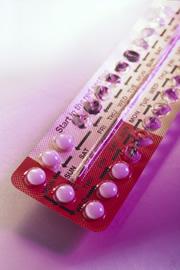 The pill's hormones could reduce, rather than increase, the danger of multiple sclerosis.© Punchstock
The pill's hormones could reduce, rather than increase, the danger of multiple sclerosis.© PunchstockWomen who take the contraceptive pill cut their short-term risk of developing multiple sclerosis by nearly half, according to a survey. The study suggests that the pill could help delay onset of the debilitating neurodegenerative disease.
Birth-control pills contain oestrogen, one of the most significant female reproductive hormones. The compound, whether produced naturally or taken as a pill, helps to regulate the menstrual cycle.
The survey's discovery adds to a range of positive effects that oestrogen has on non-reproductive organs.
The hormone seems, for example, to stop bone loss and forestall heart disease. It can provide relief from hot flushes and may even protect against cognitive decline, although studies linking cancer with hormone-replacement therapy in post-menopausal women have recently curbed medical experts' enthusiasm for oestrogen-containing drugs.
Bad reputation
Roughly two-thirds of multiple-sclerosis patients are female, and women generally have higher levels of oestrogen than men. So the disease has been blamed on the hormone in the past, explains Alvaro Alonso of Harvard School of Public Health in Boston, Massachusetts, who led the recent study.
In fact, some doctors warn women with a family history of multiple sclerosis not to take the pill.
But recent evidence seems to suggest the opposite: mice given extra doses of oestrogen are protected against a neurological disorder similar to multiple sclerosis. Like the human illness, this disease involves destruction of nerve cells' fatty protective coating, called myelin. This layer normally enables these cells to transmit signals hundreds of times faster than their bare counterparts.
With these fact in mind, Alonso and his colleagues conducted an epidemiological study to see whether taking birth-control pills reduced women's risk of developing multiple sclerosis.
Compare and contrast
He and his team used a British research database to identify 106 cases of the disease in women under the age of 50. They then examined prescription records to find out whether the women had received birth control in the three years before being diagnosed. They compared these patients with 1,001 women of similar age in the database who did not develop the neurological disorder. Overall, across all groups, around 5 women in 1,000 develop MS.
The women in this control group were much more likely to be taking oral contraceptives, the team reports in the journal Archives of Neurology1. Taking the drug reduced the risk of developing multiple sclerosis in the short term by 40%.
"The bottom line is that if a woman wants to take oral contraceptives, that decision shouldn't be influenced by fears of increased risk of multiple sclerosis," says Alonso.
ADVERTISEMENT
He stresses that the data came from the mid- to late-1990s, a time when UK doctors felt little hesitation in prescribing birth control to patients with a family history of multiple sclerosis, so such fears are unlikely be responsible for the relationship. But he acknowledges that more research is necessary to establish a firm causative link.
Alonso also says that long-term studies suggest oestrogen has no effect on a person's risk of developing multiple sclerosis. He speculates that the protective boost from the hormone lasts only a few years: "If a woman is going to get the disease, in the end she will."
